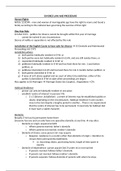Study guide
Family Law Revision
- Vak
- Instelling
These notes were used as part of my revision for the Family Law elective at University of Birmingham in which a distinction was received. Topics include: Divorce Private law children proceedings Financial orders Public law children proceedings Domestic violence
[Meer zien]



